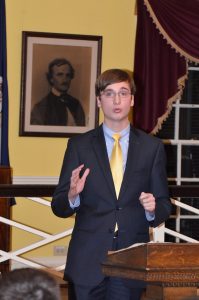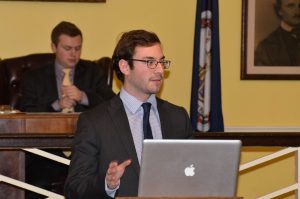
On the night of February 22nd, the first ever inter-organizational debate debate took place in Jefferson Hall between the International Relations Organization and the Washington Literary Society and Debate Union on the topic of whether or not the Doctrine of Nuclear Deterrence is viable in the 21st century.
The auditorium was packed with students supporting both organizations, in addition to a panel of UVA professors whose job was to evaluate both teams’ performances and choose a winner. Respectively for both sides, the debate started with an 8-minute instructive speech followed by 3-minute cross examination and a 4-minute rebuttal speech.
The argumentations of each team were well structured, well developed and convincing. The affirmative side offered four reasons why nuclear weapon was, is and will continue to be a viable doctrine in the 21st century. It developed its standpoint, for example, by mentioning the nuclear technology development prepared for “the possible second strike” and the rationale behind the Kubrick film Dr. Strangelove. Also, the opposing side (the Washington Society) offered an interesting perspective by developing two main arguments and several sub points, such as the idea that nuclear deterrence doesn’t work in the middle states, who have enough power to build nuclear weapons while not relying heavily on other countries. In addition, it also mentioned the nuclear proliferation incurred by nuclear deterrence.
When asked about the most interesting part of the debate, one audience member said, “I think the most interesting argument that was brought up was the entire fact that nuclear deterrence still works even if other countries acquire nuclear weapons.”
While both sides did an excellent job defending their standpoints, in the end, the Washington Society (the opposing side) convinced the judges to deem them the winners by their logical reasoning, flexible thinking model and clear development of ideas.

After the debate, Toni, the leader of opposition said that “coming up with strong rebuttals is difficult because sometimes you have to do it on a flight, so you can’t necessarily always prepare for it……Also you have to keep an open mind because there is a broad range of different types of arguments.”
Overall, the debate was a huge success. It brought attention to an extremely relevant topic, and members of both sides believe this could become the first of many debates to be held between organizations on grounds.
















